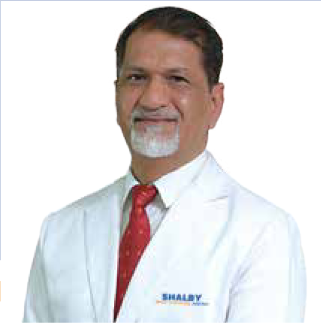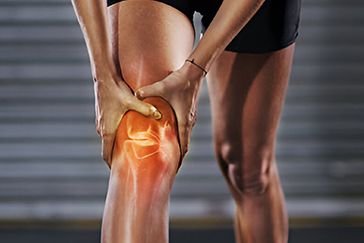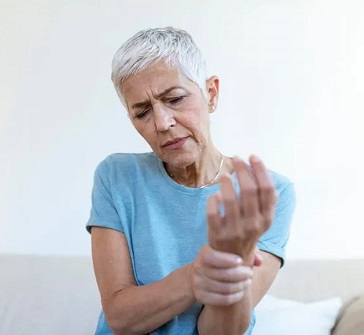 Book Appt.
Book Appt.
 Call Now
Call Now


Introduction
Osteoporosis is a condition that weakens bones. It reduces the density and thickness of your bones. People with osteoporosis are more prone to have fractured bones (bone fractures). Your bones are normally dense and robust enough to bear your weight and absorb most types of shocks. As you get older, your bones naturally lose density and the ability to renew (remodel themselves). If you have osteoporosis, your bones are much more frail.
Symptoms
Osteoporosis does not have the same symptoms as many other medical disorders. That's why healthcare experts refer to it as a quiet sickness. Even though osteoporosis does not create symptoms, you may notice a few changes in your body that indicate your bones are losing strength or density. Osteoporosis warning signs may include losing an inch or more of height, changes in natural posture, shortness of breath, and lower back pain.
Causes
Osteoporosis develops as you age and your bones lose the ability to renew and mend themselves. Your bones are living tissue, much like the rest of your body. It may not appear so, but they are constantly replenishing their cells and tissue throughout your lifetime. Until roughly age 30, your body naturally produces more bone than it loses. After age 35, bone breakdown occurs quicker than the body can repair it, resulting in a steady decrease of bone mass.
Diagnosis
A bone density test is used by a healthcare provider to diagnose osteoporosis. A bone density test is an imaging examination that determines the strength of your bones. It employs X-rays to determine how much calcium and other minerals are present in your bones. DEXA scans, DXA scans, or bone density scans are all terms used by healthcare providers to describe bone density testing. All of these are different names for the same test. A bone density test employs low-level X-rays to determine the density and mineral content of your bones. It's comparable to a standard X-ray. It is an outpatient treatment, so you will not have to stay in the hospital.
Management and Treatment
Your healthcare physician will recommend a mix of treatments to slow down bone loss and strengthen existing bone structure. The most crucial aspect of treating osteoporosis is avoiding bone fractures. The most frequent osteoporosis therapies are:
Exercise: Regular exercise can help strengthen your bones. Your doctor may recommend weight-bearing exercises to help you develop your muscles and improve your balance. Walking, yoga, Pilates, and tai chi are examples of exercises that cause your body to fight against gravity and can help you acquire strength and balance without placing too much strain on your bones. You may need to consult with a physical therapist to identify exercises and motions that are appropriate for you.
Vitamin and mineral supplements: You may require calcium or vitamin D supplements, either over-the-counter or on prescription. Your doctor will tell you which type you need, how often you should take it, and what amount you require.
Medications for osteoporosis: Your doctor will tell you which medications are ideal for you and your body. Hormone therapy such as replacement estrogen or testosterone, as well as bisphosphonates, are among the most commonly prescribed drugs for osteoporosis. Patients with severe osteoporosis or a significant risk of fractures may require drugs such as parathyroid hormone (PTH) analogs, denosumab, and romosozumab. These drugs are frequently administered as injections.
Prevention
Exercise and a healthy diet rich in calcium and vitamin D are usually sufficient to avoid osteoporosis. Your specialist will assist you in determining the optimum therapy combination for you and your bone health needs. Follow these general safety precautions to lessen the danger of injury:
Always wear a seatbelt.
Wear appropriate protective equipment during all activities and sports.
Make sure your home and workspace are clutter-free to avoid tripping you or others.
When reaching for something at home, always use the appropriate tools or equipment. Never stand on a chair, table, or counter.
Follow a healthy diet and exercise routine.
Use a cane or walker if you have difficulty walking or are at risk of falling.
Conclusion
Osteoporosis is a prevalent but treatable disorder that causes weakening bones and increases the risk of fractures. Early diagnosis and early treatment are critical for minimising bone loss and lowering the risk of major fractures, especially in the spine, hips, and wrists. For more information, visit SHALBY Sanar International Hospital, Gurugram.
SHALBY Sanar International Hospitals provides extensive medical procedures backed up with our state-of-the-art technology and a team of highly qualified & experienced clinical experts.



Life Transformed: Mr. Blojah Felix Journey to Pain-Free Living | SHALBY Sanar

Pain-Free Living After 6 Years: Knee Replacement Success Story | Dr. Rohit Lamba

Bilateral Total Knee Replacement by Dr. Vikram Shah | SHALBY Sanar International Hospitals

Remarkable Recovery Story: Hip Replacement for Non-union Fracture

Incredible Recovery Story: Bilateral Knee Replacement Transformation

Knee Replacement Surgery by Dr. Rohit Lamba: 60-Year-Old's Remarkable Recovery

Renewed Hope: Successful Hip Replacement Surgery Transforms Iraqi Patient's Life

Exploring a Case of Revision Knee Replacement: Insights from Dr. Rohit Lamba

Triumphant Journey: Ms. Fatima, 69, Triumphs Over Revision Knee Replacement Surgery

Leaving the crutches behind – Riyaz, 43, gains confidence after a successful Hip Replacement Surgery

Transformative Total Knee Replacement Surgery: A New Lease on Life for 48-Year-Old Ramesh

Miraculous Recovery: 17-Year-Old Kenyan Overcomes Osteosarcoma with Mega Prosthesis Surgery

Mr. Omar Faruk's Remarkable Knee Recovery: ACL Reconstruction Success Story

Mrs. Vijay Luxmi's Remarkable Knee Replacement Journey

Umidjon, 36, from Uzbekistan shares his gratitude for a successful total hip replacement surgery

Ms. Mohsin from Iraq shares her gratitude for a successful Computer Navigated Total Knee Replacement

A Total Hip Replacement surgery gives Ms. Barry from Ghana, the ability to walk again.

Dr. Rohit Lamba talks about a successful Hip Replacement Surgery carried out on an Iraqi patient
Our doctors pen down their research findings and experiences from time to time. Their words provide deep insight into the latest techniques, technologies and other advancements in healthcare. It provides expert answers to all kinds of health questions for real-life issues.
VIEW ALL.png)
.png)



Since the day of its foundation, SHALBY Sanar International Hospitals is committed to provide comprehensive healthcare services. It regularly organizes awareness programs in its premises and encourages outdoor healthcare activities and camps with an intent to put focus on preventive healthcare.
VIEW ALL